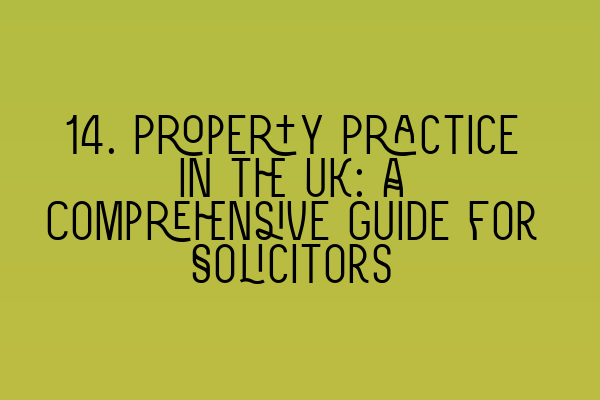14. Property Practice in the UK: A Comprehensive Guide for Solicitors
Welcome to SQE Property Law & Land Law’s comprehensive guide on property practice in the UK. Whether you are a solicitor in training or an experienced professional looking to brush up on your knowledge, this guide will provide you with valuable insights and tips to navigate the intricacies of property law.
Before we dive into the details, it’s important to note that property law in the UK is a vast and complex subject matter. It encompasses a wide range of legal principles, regulations, and procedures that govern the buying, selling, renting, and ownership of property. As a solicitor, having a solid understanding of property law is essential to providing quality legal services to your clients.
Now, let’s explore some key aspects of property practice in the UK:
1. Types of Property
Property can be classified into various types, including freehold, leasehold, and commonhold. Understanding the distinctions between these types is crucial in advising clients on their rights and obligations.
2. Conveyancing Process
The conveyancing process is the legal process of transferring property ownership from one party to another. It involves various stages, such as property searches, drafting contracts, and dealing with mortgages. Familiarizing yourself with the conveyancing process will enable you to navigate each stage effectively.
3. Land Registration
Land registration is the process of officially recording the ownership and interests in land. Acquiring knowledge about the Land Registry and the registration requirements is essential in ensuring the validity and enforceability of property transactions.
4. Leasehold Transactions
Leasehold transactions involve the granting and management of leases, which grant a person the right to use and occupy a property for a specified period of time. Understanding the intricacies of leasehold transactions is crucial in advising both landlords and tenants.
5. Residential and Commercial Tenancies
Residential and commercial tenancies require different legal considerations. Having a thorough understanding of the relevant legislation, such as the Landlord and Tenant Act 1954, will enable you to provide appropriate advice and representation to your clients.
6. Property Disputes
Property disputes can arise due to various reasons, such as boundary disputes, restrictive covenants, and landlord-tenant conflicts. Being well-versed in dispute resolution mechanisms, including negotiation, mediation, and litigation, will allow you to effectively represent your clients’ interests in resolving such disputes.
7. Planning and Development
Planning and development is a crucial aspect of property practice, particularly in commercial transactions. Understanding the planning permission process, environmental regulations, and other relevant legislation will help you navigate complex development projects.
8. Tax Considerations
Property transactions can have significant tax implications for your clients. Familiarize yourself with the relevant tax considerations, such as stamp duty land tax and capital gains tax, to provide comprehensive advice that takes into account the financial implications of property transactions.
By gaining expertise in these key areas of property practice, you’ll be well-equipped to navigate the complexities of property law and provide exceptional legal services to your clients.
At SQE Property Law & Land Law, we offer comprehensive SQE 1 and SQE 2 preparation courses to help you excel in your solicitor qualification journey. Our courses are designed to provide you with the knowledge and skills necessary to pass the SRA SQE exams with flying colors. Check out our SQE 1 Practice Exam Questions and SQE 1 Practice Mocks FLK1 FLK2 to test your knowledge and readiness for the exams.
If you’re looking for specific guidance on the SQE exams, be sure to explore our SQE 2 Preparation Courses and SQE 1 Preparation Courses. Our experienced tutors will provide you with expert guidance and support to ensure your success.
Lastly, stay up-to-date with the latest SRA SQE exam dates by visiting our regularly updated SRA SQE Exam Dates page. By familiarizing yourself with the exam schedule, you can plan your studies and preparation effectively.
We hope this comprehensive guide has provided you with valuable insights into property practice in the UK. Remember, as a solicitor, continuous learning and staying informed about the latest legal developments are vital to providing exceptional service to your clients.
